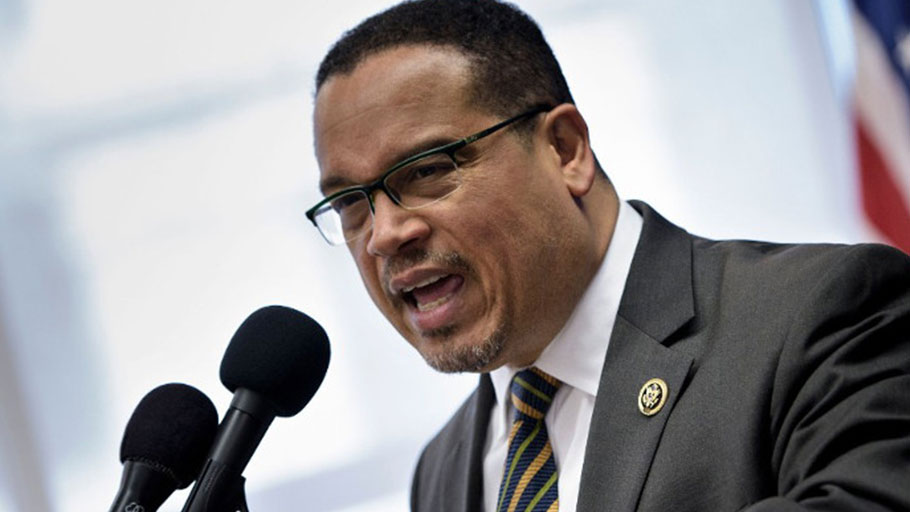Representative Keith Ellison. (photo: Brendan Smialowski/Getty)
By Keith Ellison —
When Franklin D. Roosevelt died, his casket was placed on a train that slowly traversed the country before it made its way toward his final resting place. Crowds were gathered at the train stops so people could pay their final respects, and as the train was pulling into Washington’s Union Station, a journalist saw a man who, like others, came to say his final farewell. The man was standing there with solemn eyes, and tears streaming down his face. The journalist approached the man and asked, “sir, did you know President Roosevelt?” The man lifted his head and replied, “no, but he knew me.”
By all accounts, that man was right. Despite being a New York aristocrat by birth, Roosevelt fought like hell for working people ― and emphatically not for the richest one percent. When the Great Depression struck and left people trapped in soup lines, unemployed and desperate, Roosevelt pushed a jobs plan, infrastructure spending, and for stronger labor unions. He didn’t always win, because an organized group of businessmen pushed back at every turn, but the people knew he was on their side and was fighting hard for them.
If we, as Democrats, want to understand why we’ve dropped to the minority in both houses of Congress, lost control of the White House, and fallen from 31 governorships in 2008 to 17 today, we need to think seriously about that. What I have come to believe, from traveling across the country and talking with voters in Minnesota, Arizona and New Hampshire, is that people don’t feel like the Democratic Party knows them the way they felt President Roosevelt knew them. This isn’t the Great Depression, but we are in a new Gilded Age when sixty percent of the country collectively owns just three percent of the country’s wealth, and more than a third of Americans live at or near the poverty line. Almost all new income and wealth generated over the past decade has gone to the top one percent, while most Americans work longer hours than ever before just to make ends meet.
Last year, Donald Trump exploited that desperation and convinced voters he would be tougher on Wall Street than we would. He trashed trade deals that hollowed out manufacturing towns in the industrial Midwest. He even said he was the only Republican who would protect Social Security, Medicare, and Medicaid. Donald Trump made voters feel heard, even if he was lying through his teeth about all of it. That matters, because people make voting decisions based on how a candidate makes them feel. As Maya Angelou famously put it: “people will forget what you said, people will forget what you did, but people will never forget how you made them feel.”
That’s something we, as Democrats, need to take seriously. I want to be clear: I’m not saying I have every answer, and I’m not suggesting our party doesn’t have a message. We do have a message: we’re for economic justice, gender justice and racial justice for every American. What I am saying is that Democrats need to do a better job of listening, and we can’t listen with a TV ad. We have to actually be present.
This is why I so forcefully believe in an approach to winning elections that puts organizing at the center. We need to be a party that makes investments in organizing ― not just two months before election day, but all the time, year-round. We need to be plugged in to people’s lives, hearing their concerns and struggles, and take their ideas for how to move our nation forward seriously. The DNC has taken steps towards that vision, by making unprecedented investments in state-level organizing, and by rolling out Resistance Summer, which reached more than 1.1 million voters across the country.
We have to build on that, and truly become a party built on organizing and focused on the grassroots, on the needs of people in every community. We’ve got to show up for people year-round, with forums, meetings, mobilizations and discussions, by having real conversations with them at their doorstep, and build our platform from that ― a message that comes from the doors, instead of from some poll-tested Beltway consulting firm. I suspect that if we did, we would see that what people want from politics isn’t complicated.
I suspect that if we listened, we would hear people say they want to live healthy, productive lives with their families. So as a party, we should be clear: we believe deeply that every single person in our nation has a right to health care. People want to be paid fairly for their work. So as a party, let’s stand for a nationwide minimum wage of $15 an hour, because workers are the backbone of our entire society. People want to be able to send their kid to college without going bankrupt. So as a party, we’ve got to stand for every child in this country being able to attend college without financial hardship, no matter how much wealth is attached to their last name.
That’s my vision for a party that can make people feel like we know them. In so doing, I believe we can elect Democrats up and down the ballot and make meaningful differences in people’s lives, across the nation.















